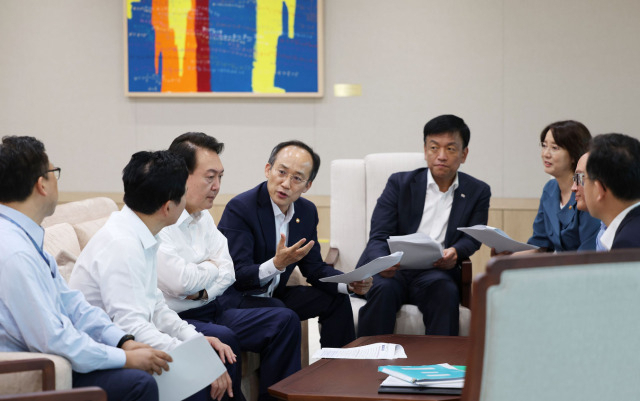Market Now
Finance ministers of Korea, Japan may meet after 7 years
 |
Finance Minister Choo Kyung-ho speaks with President Yoon Suk-yeol during his state visit to Japan earlier this month. (Presidential office) |
Top financial policymakers of Korea and Japan may hold a one-on-one meeting for the first time in seven years, following the recent easing of tensions between South Korea and Japan.
The Finance Ministry is looking into launching talks between its minister Choo Kyung-ho and his Japanese counterpart Shunichi Suzuki, following President Yoon Suk Yeol’s state visit to Japan.
With the Korean government announcing that a Seoul-backed foundation would compensate victims of wartime forced labor earlier this month, strained bilateral ties between South Korea and Japan have shown signs of thawing.
After recently meeting with Japanese Prime Minister Fumio Kishida, Yoon said further diplomatic and economic cooperation between Korea and Japan are to come.
"We will restore intergovernmental consultative bodies between the two countries to discuss common interests, including strategic dialogue between diplomatic and economic authorities,” Yoon said at a press conference held on Thursday after meeting with his Japanese counterpart.
The renewed ties may lead to economic cooperation on a governmental level.
Since 2016, the finance ministers of Korea and Japan have met seven times over the course of a decade to discuss economic cooperation between the two countries. However, the last meeting took place in 2016 between then-Finance Ministers Yoo Il-ho and Taro Aso.
Tensions between Korea and Japan escalated when a “comfort women” statue was installed near the Japanese consulate in Busan in 2017, symbolizing opposition to a settlement on the sex slavery dispute reached a year before.
In 2019, tensions were heightened with Japan's tightened controls on South Korea-bound exports of some high-tech semiconductor materials.
If the talks between the finance chiefs of the two nations are restored, the top financial policymakers are likely to discuss cooperation between the two countries for international events, including the Group of 20 and the Association of Southeast Asian Nations Plus Three summits.
Talks for a currency swap deal, however, may not be happening soon. A swap deal allows the two countries to borrow each other's domestic currency at a predetermined rate, hedging currency risks.
Korea-Japan currency swaps started out at $2 billion in 2001, and grew to $70 billion in 2011. They dropped to $10 billion after then-President Lee Myung-bak visited South Korea's Dokdo islets -- over which Tokyo claims territorial rights -- in 2012 and was eventually terminated in 2015.
Though the South Korean government asked to renew the deal, citing the US Federal Reserve's rate hikes and Brexit, Japan declined at the time.
As South Korea's foreign exchange reserves totaled $425.29 billion at the end of February, the ninth largest in the world, the swap deal will not be an immediate agenda for Korea.
Even after returning to Korea, Yoon has been continuously stressing the importance of mending ties between South Korea and Japan for further growth.
“Korea-Japan ties can be and should be a win-win relationship for both countries through joint efforts,” Yoon said, at a Cabinet meeting held Tuesday. More than 80 percent of his 23-minute speech was focused on Korea-Japan relations.
“Both the governments of Korea and Japan should do some self-reflection, eliminating what hinders the normalization and growth of bilateral ties,” Yoon said.
By Im Eun-byel (silverstar@heraldcorp.com)


![[Global Finance Awards] Mirae Asset Securities' global top-tier ambition within reach](http://res.heraldm.com/phpwas/restmb_idxmake.php?idx=151&simg=/content/image/2024/11/27/20241127050077_0.jpg)
![[Global Finance Awards] Kyobo Life enhances insurance coverage for cancer, long-term care](http://res.heraldm.com/phpwas/restmb_idxmake.php?idx=151&simg=/content/image/2024/11/26/20241126050106_0.jpg)
![[Global Finance Awards] Kakao Bank bolsters SE Asia foray with Superbank partnership](http://res.heraldm.com/phpwas/restmb_idxmake.php?idx=151&simg=/content/image/2024/11/27/20241127050076_0.jpg)
![[Global Finance Awards] IBK boosts support for small businesses](http://res.heraldm.com/phpwas/restmb_idxmake.php?idx=151&simg=/content/image/2024/11/27/20241127050072_0.jpg)
![[Global Finance Awards] Shinhan chief pushes to boost corporate value](http://res.heraldm.com/phpwas/restmb_idxmake.php?idx=151&simg=/content/image/2024/11/27/20241127050074_0.jpg)
![[Global Finance Awards] Mirae Asset bolsters global presence with W370tr under management](http://res.heraldm.com/phpwas/restmb_idxmake.php?idx=151&simg=/content/image/2024/11/27/20241127050075_0.jpg)
